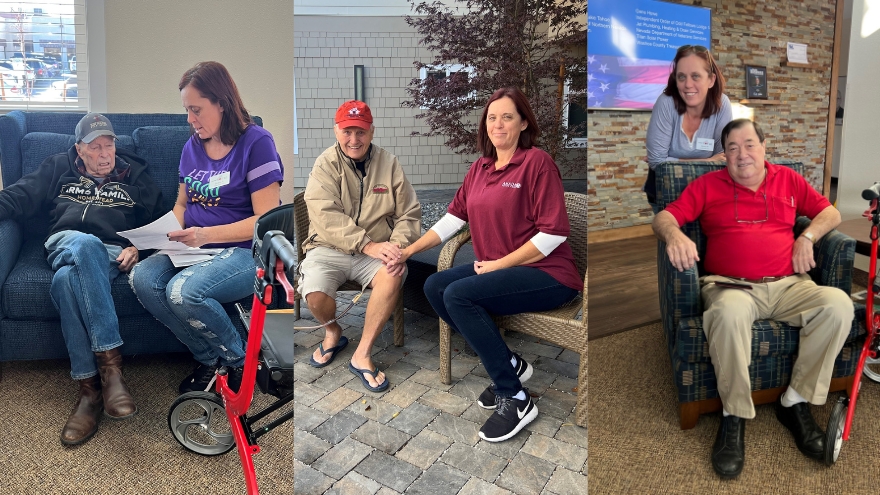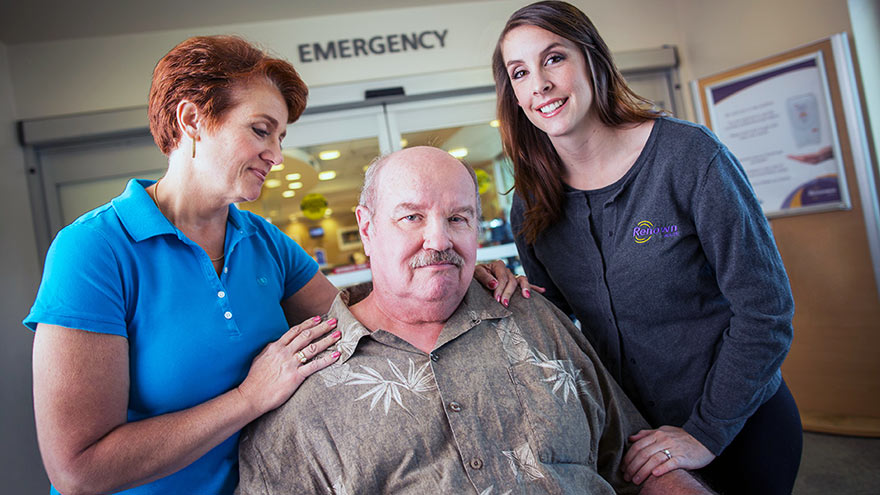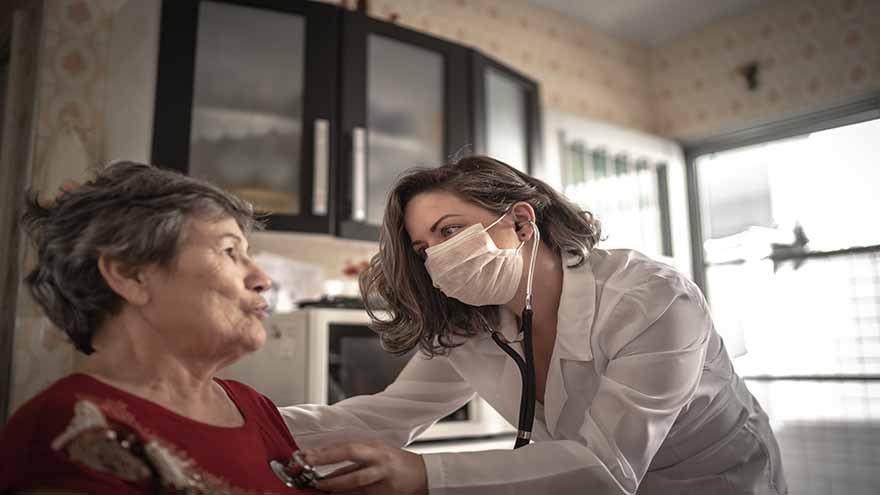Search
Results for 'doctors'
Clear-
Foods to Avoid When Taking Heart Medications
Did you know certain medications can interact with everyday food and drink? We asked VP of Pharmacy Services Adam Porath how to take these important medications safely. One in five Americans between the ages of 40 and 75 are currently taking a statin drug to reduce their cholesterol level or to prevent atherosclerosis (hardening of the arteries). Many others also take anticoagulants (blood thinners) to prevent blood clots from forming, which can increase the risk of stroke. Adam Porath, VP of Pharmacy Services at Renown Health, explains how to safely take these medications. What is a statin? A statin is a drug that can lower cholesterol by helping your body absorb cholesterol or by blocking a substance your body needs to make it. The American Heart Association cites a global study reporting the benefit of statins to help reduce heart attacks and strokes. Common statins include atorvastatin (Lipitor), pravastatin (Pravachol), rosuvastatin (Crestor) and simvastatin (Zocor). Which foods or drinks should be avoided while taking statin drugs? Grapefruit juice is the only food or drink that has a direct interaction with statins. Statins do not directly interact with any food but people taking statins should moderate their intake of saturated fats to help lower their LDL cholesterol and overall risk of cardiovascular disease. What is a blood thinning drug? Blood thinning drugs, such as warfarin, rivaroxaban (Xarelto), apixiban (Eliquis), dabigatran (Pradaxa) and edoxaban (Savaysa), are used to prevent stroke. Which foods or drugs should be avoided while taking blood thinning drugs? If taking warfarin, alcohol and cranberries (including juice) should be avoided. Patients taking warfarin should be aware of foods that contain Vitamin K (green leafy vegetables) and try to maintain a consistent diet of these foods. Warfarin interacts with many over the counter and prescription medications. Patients should consult a pharmacist when starting, stopping, or changing doses of any medication when taking warfarin. Also, patients taking any blood thinning medication should avoid over-the-counter pain relievers (i.e. aspirin, ibuprofen, etc.) How do I know whether to take my medication with food or not? Consulting with a pharmacist is the best resource to determine if a medication should be taken with or without food. In general, all statins and blood thinners can be taken with or without food. The only exception is Xarelto (rivaroxaban), which should be taken with the largest meal of the day If you are a Renown patient you can also review your prescriptions online, request a refill or ask a question via MyChart. With MyChart, you can access all your healthcare information securely 24/7.
Read More About Foods to Avoid When Taking Heart Medications
-
A Friend to Veterans, A Friend to Renown
Did you know that 218,000 veterans and their families call Nevada home? That is almost 7% of our total population who served this country and will require quality access to healthcare at some point in their lifetime. When faced with a daunting diagnosis or procedure, such as cancer or surgery, Renown rises to the occasion to provide veterans and their loved ones with the highest caliber of care possible to protect the lives that protected ours. Accessing that care, however, can be a challenge for some. As Renown serves veterans across 100,000 square miles, veterans living in rural communities often must travel long distances – with the costs of overnight lodging standing in the way, making healthcare access out-of-budget, and sometimes, nearly impossible. That’s where Veterans Guest House comes in. Veterans Guest House provides veterans and their families with temporary overnight accommodations while receiving medical treatment in the Reno/Sparks area. Founded in 1993 in response to the growing number of veterans sleeping in their cars to access healthcare, the nonprofit embraces veterans and their families who would otherwise not be able to obtain the medical care they need because of inabilities to pay for overnight lodging. A support system for veterans, especially veterans who are senior citizens, is vital to their overall health and well-being – and seniors at Veterans Guest House never have to feel alone in their care journey. Enter Dyana Parks, a senior care assistant working with Veterans Guest House. A friend to Renown Health and the William N. Pennington Cancer Institute, Dyana goes the extra mile for seniors staying at Veterans Guest House – she not only helps them navigate the logistics of their care, but she also is one of their biggest mental well-being champions. A Helping Hand for Guests in Need A proud member of a veteran family herself, senior and veteran in-home care is a family affair for Dyana. With a sister experiencing post-accident brain damage, elderly parents – one of whom facing dementia – and a son and daughter-in-law in the same field of work, Dyana has a unique passion for in-home and dementia care and holds several decades of hospice experience. As such, when she was assigned to help the clients at Veterans Guest House in September 2022, it was a natural fit for her, and she immediately jumped into action. Dyana takes special time during her work hours to transport seniors in need to their appointments at Renown (and keeps track of all of them), sits with them through chemotherapy and radiation treatments, ensures patients stay hydrated and nourished after major procedures, picks them up from surgery and always ensures everything goes well with each patient’s care. When patients coming from Veterans Guest House need extra emotional support, Dyana is always there to make sure they are okay and push them to keep going. “I always say to my seniors, ‘never give up,’” said Dyana. “If a need arises, I am there to help. I love getting to know my clients and helping them go home healthy.” As a ‘frequent flier’ at Renown and the William N. Pennington Cancer Institute, many of our team members are thrilled when they see Dyana walking through the doors with her clients, as they know that their patient is going home with one of their strongest advocates. To Dyana, Renown is akin to a family for both herself and her clients. “I love Renown,” said Dyana. “Everyone there makes my clients feel as though they are more than just a patient – they make them feel like family, especially when going through a scary diagnosis like cancer. As someone who has been going there with my own family forever and who now guides veteran seniors through the process, I will always recommend Renown to anyone.” Dyana emulates exactly what it means to make a genuine difference in the health and well-being of our community, all while raising awareness for both Renown and Veterans Guest House. “More people need to know about Veterans Guest House,” said Dyana. “When I came here, I was in awe. They do so much for every guest, making them feel comfortable at home while not having to worry about finances. Almost everyone that comes here, whether it be from the rural surrounding towns or all the way out to Alaska and even the Philippines, needs treatment of some kind, and I know Renown will always give them the best care.” To learn more about Veterans Guest House, visit veteransguesthouse.org.
-
What to Expect at a Renown Health ER
Access to a trusted and efficient emergency room (ER) in times of unexpected medical emergencies is crucial. Renown Health’s emergency and trauma care is available at three ER locations, including the region’s only level II trauma center and ER designed for pediatric patients to provide you and your family with prompt, high-quality and specialized care by board-certified emergency physicians when you need it. Dr. John Hardwick, board-certified emergency physician at Renown Health, describes a guide to emergency care at Renown Health below. Timely and Compassionate Care: Renown ER is committed to delivering timely and compassionate care. Experienced medical professionals at Renown will communicate openly with you, involving you in the decision-making process and addressing any concerns you may have. Upon arrival, you can expect to be promptly assessed by a team of skilled medical professionals who will prioritize your needs based on the severity of your illness or condition. Click here to learn more about the emergency care process, from check-in to discharge. Expert Medical Team: With advanced technology and experienced specialists from Northern Nevada Emergency Physicians, all patients are in good hands for emergency care at Renown Health. Our pediatric and adult emergency physicians have completed fellowship training in specialty areas such as sports medicine, ultrasound and emergency medical services. Team members in the emergency department will ensure you are informed and as comfortable as possible during your visit to minimize any pain or discomfort you may feel. Efficient Triage Process: Renown ER utilizes an efficient triage process to prioritize patients based on the urgency of their medical condition. This ensures that those with more critical conditions receive immediate attention, while still providing timely care for others. Tests such as labs or diagnostic services will often be completed while you wait to see a physician to expedite the process. Comprehensive Diagnostic Services: The ERs at Renown offer comprehensive diagnostic services to quickly identify your symptoms. This may include X-rays, laboratory tests, CT scans and other imaging studies, helping emergency physicians make informed decisions about your treatment plan. Specialty Care and Collaboration with the Renown Health Network: We offer the area's largest network of specialized providers and services to help ensure you receive industry-leading, personalized care during and after your emergency room visit. This collaboration means you’ll have access to more specialists and a wide range of expertise to continue your care without leaving the Renown Health network. State-of-the-Art Facilities: Renown Health invests in state-of-the-art facilities and equipment to ensure that patients receive the best possible care. Renown ERs are equipped with modern medical technology, allowing board-certified emergency physicians to diagnose and treat a wide range of medical conditions. Post-ER Visit Support and Resources: Your experience with Renown Health doesn't end when you leave the ER. Our team will address your questions and provide you with post-visit instructions, medications and follow-up recommendations to continue your care. With a commitment to timely and compassionate care and a team of expert healthcare professionals, you can trust Renown ER to provide the highest standard of emergency medical services when you need it most.
-
Getting to the HEART of Research
In February, we think about hearts not just in honor of Valentine’s Day but because it is American Heart Association Month. This is a great reminder to focus on our personal cardiovascular health. Renown Health helps patients think about their heart health with our world-class providers and cutting-edge treatments through our Cardiovascular Clinical Trials. “Research serves a vital role in the future care of cardiovascular diseases. Being involved in research will help our medical community to further discover new treatment plans in our quest for life preservation and extension,” Dr. Thomas To, Cardiologist and Researcher at Renown Health. For example, let’s talk about atherosclerosis. When our hearts are healthy, they are a strong muscle that pumps our oxygen-rich blood through our coronary arteries. Over time, cholesterol and fats can build up in our arteries. This is a condition known as atherosclerosis. This type of plaque buildup in the arteries can lead to a heart attack or stroke if not properly managed. If you are experiencing chest pain or discomfort, shortness of breath or pain in areas of the upper body, these can be the warning signs of a heart attack, and you should call 911. One contributing factor to atherosclerosis is elevated lipoprotein(a) levels and the accumulation of cholesterol in the arteries, which increases the likelihood of a heart attack or stroke. Lipoprotein(a) is tested separately from the standard panel that is completed for cholesterol management, and while your total cholesterol levels may be in a healthy range, lipoprotein(a) levels can still be elevated. "Increasingly we are realizing that lipoprotein(a) levels can be used as an important assessment in more carefully delineating an individual's risk of future cardiovascular events and treatment targets" said Dr. Michael Bloch, Lipid Specialist and Researcher at Renown Institute for Heart and Vascular Health. While it is clear that elevated lipoprotein(a) contributes to atherosclerosis, there are currently no approved medications for reducing cardiovascular disease risk through reducing lipoprotein(a) levels. This is why Renown Health’s Research Office is proud to offer a phase III clinical trial, called the OCEAN(a) study, to our patients with elevated lipoprotein(a) levels as a care option for management of their heart disease risk. Our teams of expert providers and researchers are here to support you on your healthcare journey. “I am thrilled to be able to be part of this study and bring opportunities like this to our patients. The highlight of my day is getting to hear life stories from my patients during our study visits,” Lisa Preciado, Primary Clinical Research Coordinator for the OCEAN(a) study said. Join us in raising awareness around American Heart Month by talking to your provider about lipoprotein(a) at your next appointment. At Renown Health, our goal is to make it easy for patients to access clinical research as a care opportunity where patients can access a variety of standard care treatment options for their health condition or choose to participate in a clinical trial. For more information about clinical trial opportunities available to you or to ask any questions, contact the Renown Research Office at Renown-CRD@renown.org or 775-982-3646.
-
Keeping Research Close to Northern Nevada
Clinical research provides agency for our patients navigating a scary diagnosis, and the field has never been stronger in northern Nevada. This strength is thanks in part to the Affiliate Clinical Research Office (ACRO) formed by the 2021 affiliation between Renown Health and the University of Nevada, Reno School of Medicine. Since its creation, the ACRO team has been busy ensuring that community members have access to the latest care options and exceptional experiences as participants in both research and their healthcare. Here are just a few things that set this office apart from the rest. 1. A focus on engagement In 2022, the ARCO team focused on promoting a research culture with patients, clinicians, residents and students by intentionally engaging with healthcare providers, department administrators, internal research team members and leadership. They educated the community with learning materials that emphasized the importance of doing research. This team also worked with front-line staff to raise awareness and excitement about the clinical research options available for Renown Health patients. 2. Meaningful partnerships The most impactful partnership to date is between Renown Health and UNR Med. By identifying opportunities and leveraging resources across institutions, we have maximized our impact and built a solid and sustainable foundation. This gives the people of northern Nevada greater access to new interventions or novel treatments. This team is also investing in the community and national partnerships to provide training opportunities for our research staff and learning opportunities for our medical students. 3. Novel treatments across many disease areas Our research study offerings must reflect the healthcare needs of our community and the expertise of practicing clinicians. The department has over 80 active studies in neurology, pulmonology, oncology, cardiology, pediatrics and disease prevention. The ARCRO team strives to expand care opportunities to allow our community members to stay close to home when seeking care. This year, they will continue exploring our community's unmet healthcare needs by bringing new treatment options to the greater Reno area.
-
Staying Heart-Healthy with Genetic Screening
February is American Heart Month. While cardiac care is crucial every time of year – especially as heart disease stays the number one killer in the United States – American Heart Month serves as a great reminder to stay on top of your heart health. We spoke with Malina Ruiz, a cardiology nurse practitioner at Renown Health, on three key ways to embrace heart-healthy living and how genetic screening can help inform you of certain genetic risks that can play a role on the cardiac life stage. 1. Invest in a heart-healthy diet. Eating a diet that is rich in fruits, vegetables, whole grains and healthy fats (including monounsaturated fats such as avocados and polyunsaturated fats such as sunflower oil) is a key defense in protecting your cardiac health, according to Malina. While you are filling your plate with these nutritious foods, remember to keep an eye on your saturated and trans-fat intake, and try limiting foods that are high in those fats. “No matter what age we are, maintaining a heart-healthy diet will always be important,” said Malina. Need help finding cardiac-friendly meals? The National Heart, Lung and Blood Institute makes it easy with heart-healthy recipes and tips from experts. 2. Do an exercise audit. “Keeping an active lifestyle during our younger years is one of the most important factors that affect heart health in future years,” said Malina. Maintaining a regular exercise regimen that allows you to raise your heart rate and break a sweat can help prevent future cardiac events. A good rule of thumb is to aim for 150 minutes a week of moderate-intensity exercise, which averages out to 30 minutes a day on 5 days out of the week. It’s never too late to start a regular exercise routine! Exercise doesn’t have to be something you dread – leverage American Heart Month to find activities that you enjoy. The American Heart Association can help you discover new ways to move your body. At the end of the day, as Malina emphasizes, “any movement is better than nothing!” 3. Don't skip those check-ups. Regular preventative visits with your primary care provider can help you identify possible risk factors for heart conditions before they start actively affecting your life. “Check-ups become even more important as we age, along with being aware of the signs and symptoms of heart disease, heart attack and stroke,” added Malina. There’s no time better than the present – call our expert scheduling team today at 775-982-5000 to request a preventative check-up with your primary care provider.
Read More About Staying Heart-Healthy with Genetic Screening
-
2 Dangerous Car Seat Mistakes and Solutions
Car seat mistakes can have very serious consequences. Misuse of a car seat can injure your child, or fail to keep them safe in the event of a crash. A lot goes into finding the right car seat for your child. With so many factors to consider (including age, weight and height of the child, type and brand of a car seat, cost of the car seat, etc.) it can be easy to forget critical factors. Here are two common mistakes that certified technicians often find when speaking with parents. Mistake #1: Getting a used car seat without knowing its history Why: A used or secondhand car seat can pose several factors that can compromise its safety in a crash. First, car seats expire six to ten years after their date of manufacture, so refer to the car seat's manual for recommended car seat longevity. The safety mechanisms can be compromised if a car seat has been in a crash. So it's crucial to replace your car seat following a collision. Solution: Only use a car seat if you know its history. A new car seat is your best bet, as they are up to date on the latest safety guidelines, and safety mechanisms are up to standard. However, if you are considering a used car seat for your child, please ensure the following: The car seat has never been in a car crash. The car seat isn't expired or outside the manufacturer's recommended longevity. It comes with the car seat manual and has all safety labels, including manufacture date, model number, and use instructions and restrictions. The car seat or any of its parts have not been recalled. The overall state and integrity of the car seat and its parts are undamaged. The carseat or any of its parts have not been recalled and are present and in working order.
-
Three Emergency Room Options for You and Your Family
Renown Health has three emergency rooms open 24 hours a day, seven days a week, ready to serve our community. We checked in with Amy Hawkins, Manager of Clinical Nursing at Renown South Meadows, to learn more about the emergency room experience and how each can accommodate your emergency care needs. 1. Renown Regional Emergency Room The emergency room at Renown Regional Medical Center is the only Level II Trauma Center between Sacramento and Salt Lake City, treating more than 80,000 ER and trauma patients annually. Services Offered: This location offers immediate emergency care covered by general surgeons and coverage by the specialties of orthopedic surgery, neurosurgery, anesthesiology, emergency medicine, radiology and critical care. In addition, tertiary care needs include cardiac surgery, hemodialysis and microvascular surgery. (Patients may be referred to a Level I Trauma Center.) Renown Regional ER Location 2. Renown South Meadows Emergency Room South Reno is expanding, and so is Renown South Meadows ER! Exciting transformations are happening across this campus, including the new 121,000-square-foot specialty care center and upgrades to the existing medical center—expanding care to our patients. Added benefits to the more intimate setting at South Meadows: Smaller ER also means more personal experience. The team traditionally has more time to spend with each patient at the bedside. A smaller campus means convenient parking, as the ER is just outside the front entrance; however, patients are reminded to follow marked road signs when approaching the campus during construction. Most patients arrive by private vehicle versus an ambulance, so we are very accustomed to thinking quickly on our feet. Benefits to new construction: A new Cath lab will allow us to treat patients experiencing a heart attack and needing immediate intervention to open vessels in their hearts. Additional lab and imaging capabilities for our patients Services Offered: This location offers immediate emergency care staffed with board-certified emergency physicians. Patients can expect one-on-one interactions with trusted providers and shorter wait times. All emergency room services are open during construction, and patients are reminded to follow marked road signs when approaching the campus. South Meadows ER Location 3. Renown Children's Hospital Emergency Room This location offers immediate emergency care, with pediatric specialists always on staff. In addition, the Children's ER lobby is ideal for our littlest patients, with a child-friendly atmosphere and vibrant colors to help decrease the anxiety accompanying emergencies. Medical equipment is sized just for kids, and we offer a distraction machine, games and movies to help children cope with what can be a traumatic experience, like getting an IV. In addition, we have Child Life Specialists available to provide emotional support to both children and their families. When to Bring Your Child to the ER: Allergic reactions Asthma attacks Baby under three months old with a temperature higher than 100.4 degrees Fahrenheit Broken bones Burns Choking or poisoning Difficulty breathing Eye injuries Fainting, dizziness and confusion Head injuries Heart attack Rashes Seizures Severe bleeding Severe headache Severe pain Skin infections Stitches Stroke Venomous stings and bites Renown Children's Hospital Location
Read More About Three Emergency Room Options for You and Your Family
-
Your Top 5 Questions about TAVR Answered
Your heart is the muscle in charge of pumping blood to your entire body. This vital organ is made up of chambers, valves and blood vessels. Your heart valves work similarly to a one-way door: they open and close, controlling blood flow in the correct direction through the heart chambers. For patients who have been diagnosed with a heart-related condition like aortic valve stenosis (narrowing), it is important to know treatment options. Most might think open-heart surgery is the only way to treat a heart valve, but many hospitals, including Renown, also offer a minimally invasive procedure called a Transcatheter Aortic Valve Replacement (TAVR). Dr. Abhilash Akinapelli of Renown Institute for Heart & Vascular Health shares his answers to the top five TAVR questions: 1. What causes aortic valve stenosis? Aortic valve stenosis can be caused by a variety of factors. The main reasons being wear and tear of the valve due to aging; genetically abnormal heart valve (bicuspid aortic valve); long-standing high blood pressure; and other reasons like radiation exposure. 2. Am I a candidate for TAVR? Renown’s heart care teams are made up of your primary care provider, cardiologist and cardio thoracic surgeon. They will evaluate if patients are a good candidate for the TAVR procedure by performing a variety of screenings and tests. Some of these include: Echocardiogram Electrocardiogram (ECG or EKG) Chest X-ray Exercise tests or stress tests Cardiac computerized tomography (CT) scan Cardiac catheterization 3. What are the advantages of the TAVR procedure? The Transcatheter Aortic Valve Replacement (TAVR) procedure is much less invasive than open heart surgery, otherwise known as a Surgical Aortic Valve Replacement (SAVR). Patients can typically return to their normal lifestyles within a week after leaving the hospital. During the TAVR procedure, a stent valve mounted on a balloon is advanced to the heart through the blood vessels in the groin without any incision. Once in position, the balloon will be inflated to firmly expand the new valve inside the diseased old valve, pushing it away to the sides. Once the new valve is in place, it begins working immediately and the deflated balloon is removed. The surgical procedure is approximately one hour long. Patients can get up and walk after four hours and will be discharged the following day if no complications arise. Compared to a SAVR, recovery time is much shorter and less risky for patients above the age of 75. A big advantage for anyone who fits under the criteria for a TAVR. 4. Is the procedure painful? The TAVR procedure is not surgery, but you will still be asleep during the procedure. Since no incision is made, it is essentially a painless procedure. Patients may experience slight discomfort such as aches and pains at the entry site of the catheter. 5. Can I have an MRI and X-rays done after having a TAVR valve? Yes, patients can have MRI scans and X-rays after TAVR. For further questions and information about the TAVR procedure, please consult with your Renown heart care team at 775-982-2452 or through MyChart.
-
8 Reasons to See a Cardiologist
While February is recognized as American Heart Month, it’s important to prioritize your heart health 365 days a year. Cardiologists play an integral role in our overall health and wellbeing – they are the experts when it comes to preventing and treating heart and vascular diseases. Dr. Jad Al Danaf of Renown Institute for Heart & Vascular Health shares eight reasons to visit a cardiologist. 1. Abnormal EKG The American Heart Association states an electrocardiogram, abbreviated as EKG or ECG, is a recording of the heart’s electrical activity to measure the rate and rhythm of the contractions in the upper and lower chambers of the heart. An EKG detects heart problems or abnormalities. If you have an EKG that shows abnormal results, you’ll want to see a cardiologist. An abnormal EKG can mean many things, such as irregular heart rate, heart rhythm abnormalities in the shape or size of the heart, medication side effects, and more. A cardiologist is most qualified to evaluate an abnormal EKG and determine the cause. 2. Immediate family history of heart disease or sudden cardiac death Knowing your family health history is essential to identify if you’re at risk for certain health conditions such as heart disease. For example, if you’re aware of anyone in your immediate family who had or has had heart problems or passed away from sudden cardiac death. In that case, you’ll want to discuss it with a cardiologist so they can determine if screenings, medications, or lifestyle changes are needed to help lower your risk. 3. Chest pain or shortness of breath with exertion If you have chest pain or shortness of breath that starts or worsens with activity, it may indicate a heart problem, and you should schedule a visit with a cardiologist immediately. Severe chest pain might be a sign of a heart attack or other serious medical emergency. If you’re experiencing severe chest pain, shortness of breath, or any other signs of a heart attack, call 911 immediately. 4. High blood pressure Have you had a high blood pressure reading? If so, it’s recommended to consult with a cardiologist for further evaluation. High blood pressure puts you at risk for heart disease and stroke, as uncontrolled high blood pressure can damage arteries, reducing blood flow and oxygen to your heart and brain.
-
Preventing Spinal Cord Injuries: What to Know
If you're not taking safety precautions during mountain sports, you could be at risk for a spinal cord injury. Dr. Benjamin Pence of Renown Rehabilitation Hospital explains the best way to prevent this serious injury. Mountain sports are a big part of the winter season here in our area, but if you’re not practicing all the proper safety techniques, you could end up with a serious spinal cord injury. Benjamin Pence, MD, Renown Rehabilitation Hospital, is here to offer tips to prevent this serious injury while you’re out enjoying what the Truckee Meadows has to offer. What is the spinal cord? The spine stretches from the base of your skull to the coccyx (commonly referred to as the tailbone). Your spine is made up of 24 vertebrae—seven cervical, which are in your neck, 12 thoracic, which are in your chest, and five lumbar, which are in your lower back. There are ligaments and muscles attached to each vertebra. These facilitate back movement and protect the bones from damage. There is cartilage between each vertebra which acts as a shock absorber for your spine. Finally, the spinal cord is a long, thin, tubular bundle of the nervous tissue and support cells that is enclosed in the spinal canal and send signals from the brain to everything from your arm and leg muscles to bowel and bladder function. The brain and spinal cord together make up the central nervous system.
Read More About Preventing Spinal Cord Injuries: What to Know
-
Living with COPD? How to Maximize Your Summer Experience
June offers an official welcome to summer and the height of outdoor activities in northern Nevada such as hiking, camping, days spent at the lake and embracing long days and warm evenings with friends and family. Enjoying all that the summer season has to offer may not be as easy for those living with chronic obstructive pulmonary disease, or COPD, which effects more than 15 million Americans. What is COPD? COPD is a group of lung diseases including emphysema and chronic bronchitis that result in airflow blockages from the lungs. People may experience frequent coughing and shortness of breath among other symptoms. COPD typically impacts adults ages 65 and older and is becoming increasingly more common among women. Although smoking plays a key role in the development of COPD, air pollution and indoor air quality, and respiratory infection also contribute to disease development. While there is no cure for COPD, limiting progression of disease and managing symptoms can be achieved through lifestyle changes, therapy, and medications. Tips for Living with COPD This Summer, and Always Stay Hydrated: Staying hydrated is extremely important for people with COPD, especially during the summer. Not drinking enough water can make breathing more difficult because it increases respiratory symptoms. Make sure to always keep a water bottle with you and aim to drink 8-10 glasses of water daily. Be Mindful of Temperature: COPD symptoms can be exacerbated by hot weather. It is best to participate in outdoor activities during the cooler times of day, like the morning or evening. Check Air Quality Before You Go: Before engaging in outdoor activities, be sure to check the air quality index and plan your activities accordingly. Pace Yourself: Exercising can be difficult for people who have COPD. To make the most of your summer, try not to push yourself too hard and take breaks when you need them. If you start to feel out of breath or tired, take a break in a cool, shaded area until you feel better. Take Matters Into Your Own Hands To address the needs of community members living with COPD, the Renown Health Research Office has teamed up with Pulmonary Medicine to provide patients who are former or current smokers and have a history of frequent exacerbations with an option to participate in the ARNASA study. "COPD exacerbations have a huge negative impact on patient’s lung function” states Dr. Farah Madhani-Lovely, Chief of Pulmonary Medicine at Renown Health and Assistant Dean of Clinical Research at the University of Nevada, Reno School of Medicine. “We have had inhalers and prednisone for decades but patients are still having exacerbations. Now we have a new pathway we think will prevent exacerbations which is what this clinical trial is designed to prove.” This study will evaluate the efficacy and safety of astegolimab compared with placebo in participants 40-80 years of age with COPD. “This study in particular is so exciting because of the enthusiasm from the sponsor’s end” says Katie Buckley, Lead Clinical Research Coordinator working on pulmonology studies at Renown’s Clinical Research Office. “Often times sites aren’t assigned particularly passionate or engaged personnel who aid in carrying out these studies, but you can tell Roche Genentech’s team truly cares about the success of the study, the safety of their participants, and proving the efficacy of the investigational agent. Working on a study like this takes a village, and when the individuals on all ends share similar mindsets and work towards success as a collective unit instead of as individual moving parts, it’s amazing to see everything we’re able to accomplish.” Renown’s team of expert pulmonologists and researchers are available to join patients with COPD in support of their healthcare journey. If you are interested in learning more about this clinical trial option at Renown Health, talk to your pulmonologist at your next appointment or contact us at 775-982-3646. At Renown Health, our goal is to make it easy for patients to access clinical research as a care opportunity where patients can access a variety of standard care treatment options for their health condition or choose to participate in a clinical trial. For more information about clinical trial opportunities available to you or to ask any questions, contact the Renown Research Office at Renown-CRD@renown.org or 775-982-3646.
Read More About Living with COPD? How to Maximize Your Summer Experience











